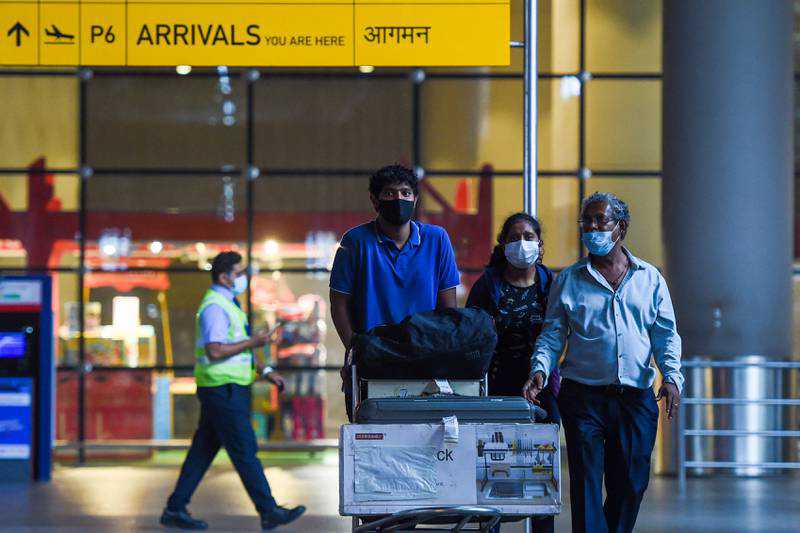UAE-India travel: everything you need to know before you go
22 February, 2022

India has updated entry requirements for incoming travellers, removing the need for vaccinated passengers from certain countries to present a negative PCR test result on arrival.
The new rules apply to travellers from 87 countries including Oman, Saudi Arabia and Lebanon, but not the UAE.
Passengers who received both doses of their Covid-19 vaccination in India also no longer need to present a negative PCR result, meaning Indian residents returning to the country from the UAE are exempted from having to take a test when leaving the Emirates. If you’re planning to travel to India in the near future, here’s everything you need to know before you go.
Do I need to quarantine in India?
Travellers arriving in India no longer need to quarantine after authorities removed the need for seven-day mandatory home isolation for passengers coming from overseas. Only travellers who are symptomatic, and subsequently test positive for Covid-19, will have to quarantine.
Instead, all travellers should self-monitor their health for 14 days from the date they arrive in India.
Do the new rules apply to vaccinated passengers?
The new rules apply to all arriving passengers, regardless of vaccination status.
Do children need to quarantine on arrival in India?
No, children do not need to quarantine on arrival, but parents should monitor their symptoms for 14 days after arriving in the country.
Do I need a negative PCR test to take a flight?
Vaccinated arrivals from certain countries no longer need to present a negative PCR test result when flying to India. Passengers who received both doses of a Covid-19 vaccination in India will also no longer need to present a negative PCR result, regardless of the country they are flying from.
There are 87 countries on the list from where PCR tests are not required. The detailed list can be found here.
All other travellers must have a negative PCR test taken within 72 hours of departure. Travellers should upload the test results to the Air Suvidha portal before flying.
Children below 5 are exempt from testing rules both pre and post-arrival, but those aged 5 and above must follow the rules in place for adults. Any children who develop symptoms of Covid-19 at any point during their trip will have to take a PCR test, regardless of age.
What do I need to do before flying to India?
There are a few documents that need to be submitted by passengers travelling to India.
Firstly, there’s a self-declaration form which can be submitted online via the Air Suvidha portal, this needs to be filled in before travel and must include details of any countries visited in the previous 14 days.
There’s also a declaration to be completed for each passenger, certifying that the Covid-19 negative certificate submitted is authentic, and agreeing to criminal charges if it turns out otherwise.
Travellers also need to download the Aarogya Setu app on their mobile devices for Covid-19 track and trace purposes in India.
Will I be tested for Covid-19 on arrival in India?
Some travellers will need to undergo further PCR testing for Covid-19 on arrival in India. New regulations state that 2 per cent of total passengers on each flight will undergo random post-arrival testing at the airport.
These travellers will be identified by the airlines. After the on-arrival test, they can leave the airport and will only need to isolate if their tests return positive results.
There will also be thermal screening by health officials in airports across the country.
Is India still using its 'at-risk' list for travel?
The most recent update to India's travel rules means that the previous "at-risk" list of countries from where travellers had to undergo additional entry rules no longer applies.
What happens if I test positive while in India?
If you develop symptoms and subsequently get a positive PCR test result, then you’ll have to go to an isolation facility where a doctor will assess you and advise on the follow-up process.
Close contacts of a positive case will be contacted, including co-passengers and anyone in the home or hotel where the person with Covid-19 has been isolating. Fellow passengers who were seated three rows in front and three rows behind anyone who tests positive will also be considered close contacts.
Until when are the new rules in place?
No end date has been set for the new home quarantine rules with official documents stating that the rules are in place until “further orders”.
India recorded 16,051 new Covid-19 cases on February 21 alongside 206 new deaths, according to John Hopkins University data.
The country has recorded more than 42 million total cases since the onset of the global pandemic, says Johns Hopkins.
Anything else I need to know?
Different states in India may also have their own rules for Covid-19 management, so travellers should check the rules in place for the destination they are travelling to.
Source: www.thenationalnews.com
